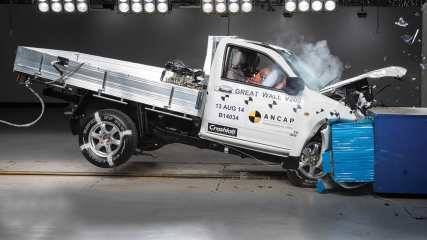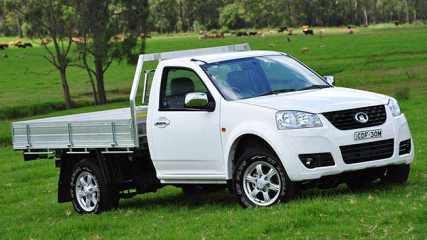Great Wall V200 News

Chinese ute slammed again for "poor" crash safety
Read the article
By Joshua Dowling · 23 Sep 2014
Chinese made Great Wall V200 ute scores three stars for safety as sales continue to fall. The reputation of Chinese utes has taken another hit as the latest crash tests award just three stars out of five for safety -- and sales continue to freefall after the asbestos scare of 2012. The Great Wall Motors single-cab ute is one of the cheapest workhorse vehicles used by tradies, with a starting price of $18,990 drive-away. But according to independent crash test authority -- the Australasian New Car Assessment Program (ANCAP) -- the Great Wall Motors single-cab trayback ute scored a “poor” three-star rating out of a possible five. This is a modest improvement from the two-star rating scored for other Great Wall utes in 2009 and 2010, in which the airbags proved ineffective at improving the safety score. In the latest crash test at 64km/h the Great Wall ute’s “compartment lost structural integrity, accelerator pedal movement was excessive, and steering column components were a potential source of knee injury for the driver”, said the ANCAP report, which awarded just 6 points out of 16 for the offset test. The safety of trade vehicles has historically lagged behind that of passenger cars, even though utes are now the third-biggest vehicle category after small cars and SUVs. However, under new Occupational Health and Safety guidelines, many companies are now enforcing a five-star policy when purchasing utility vehicles. The Volkswagen Amarok was the first ute to be awarded a five-star safety rating in Australia, in 2011, but several other brands have followed since, including the Ford Ranger, Holden Colorado, Mazda BT-50, and certain Toyota HiLux and Isuzu D-Max models. The Nissan Navara and Mitsubishi Triton score four stars for safety but are due to be replaced by all-new five-star models next year. The poor safety result for the Great Wall Motors ute comes as sales figures show Chinese vehicles are no longer a threat to the established brands. Sales of Chinese vehicles have been in freefall in the two years since 21,000 Great Wall utes and SUVs and 2250 Chery passenger cars were recalled for having engine parts containing asbestos. At their peak in 2012, more than 12,100 Chinese vehicles were sold locally. But so far this year just 2500 Chinese vehicles have been sold, a dramatic drop of 54 per cent from the same period last year. There are now at least seven Chinese automotive brands on sale in Australia but Great Wall and Chery are the largest; the others are yet to publish sales figures. A spokesman for the Australian distributor of Great Wall Motors, Chery and Foton said the established Japanese car makers had come down in price, putting pressure on Chinese brands. “The massive devaluation of the Japanese Yen … has meant that well established Japanese vehicle brands are able to be much more competitively priced in the Australian market than was the case when Great Wall launched here in mid 2009,” said spokesman Daniel Cotterill. He said emerging brands traditionally compete on price, but that price advantage had all but evaporated over the past two years. “Where once a Great Wall ute might have had six or seven thousand dollars of price advantage over an established Japanese brand, that is not the case at the moment in many instances,” said Cotterill. “Currency fluctuations are cyclical and we remain optimistic that our competitive price position will return.” The Chinese car sales downturn comes as another division of Great Wall Motors has signaled its intention to set up in Australia under the Haval brand name. However, the all-new Haval SUV that was due in Australia this year has been delayed indefinitely after it was withdrawn from sale in China twice because of build quality concerns.

Great Wall recalls 9000 cars in Australia
Read the article
By Karla Pincott · 17 Jan 2014
Great Wall's Australian distributors Ateco Automotive have issued a recall notice for the brand's V200 utes, in which the position of a bracket in the engine bay means the wiring harness can rub against the bottom of the radiator, wearing through the wiring insulation. The defect can prevent the vehicle from properly earthing, which can cause the alternator dash light to activate, the battery to go flat, and the wiring to melt.The problem affects 9134 of the Great Wall V200 2.0-litre turbodiesel utes, which have been something of a price leader in the segment, starting at $22,990. The recall affects both both rear-wheel and 4WD versions. However the defect does not affect the largely mechanically identical X200 SUV, as while it uses the same drivetrain it has a different wiring harness bracket.The safety recall affects all model years of the Great Wall V200s sold since they first arrived in 2011. According to official VFACTS figures, Great Wall sold 2667 of the V200 in 2013, 4793 in 2012, and 1170 when it first appeared in 2011, for a total of 8630 to the end of 2013. The remaining 533 have either been sold during the first weeks of January or are still sitting in dealers' stock.Ateco is sending a letter to all affected customers, advising them to contact their nearest authorised dealer and have their ute inspected and the problem rectified.Great Wall spokesman Daniel Cotterill says the fix is a fairly minor job in most cases, and will not take up much of the owners' time."For most of the affected cars, what they have to do is inspect the bracket and if necessary adjust it to give extra clearance to the harness and components around it. On most of them it won't have even been rubbing, but the inspection and adjustment will take about 20 minutes," Cotterill says."On some of the vehicles, they will need to repair the wiring harness because it will have been rubbing, and that will take a total of 30 minutes for inspection and repair. On a very small minority -- we believe only about 30 vehicles of the 9134 recalled -- they might find the wire has been exposed and the insulation can't been repaired, and under those cirsumctances they need to replace the harness, which will take about two hours."Cotterill says there have been no accidents associated with the defect. "The worst reported is some melted insulation, warning lights coming on, batteries not charging -- that sort of thing.

Great fall of China car sales
Read the article
By Joshua Dowling · 20 Jun 2013
Chinese cars were tipped to dominate the budget-car class and challenge established brands in half the time it took Japanese and South Korean companies - but the bubble has burst before it's properly inflated. After some early success since becoming the first Chinese brand to go on sale in Australia, Great Wall Motors has hit reverse and its Chinese peers are struggling to get into first gear.Official figures for the first five months of the year show Great Wall Motors deliveries are down by 35 per cent compared with the same period the previous year in a record market that is up by 4.5 per cent.Other Chinese brands such as Foton have also had a stalled start. After announcing big plans two years ago Foton has sold fewer than 300 pick-ups in that time.Budget brand Geely has still restricted its sales to Western Australia and Chery's small cars have been stymied by newer competition from established brands. Chery sales are also down by 35 per cent.The Chery J1 hatchback was the cheapest car in Australia in almost two decades when it went on sale with a $9990 drive-away price in 2011, and is now available with a "pay half now, half later'' deal.But it too has failed to rock the sales charts. ''Sales have slowed for now but they will recover,'' says Daniel Cotterill, the spokesman for Ateco, distributor of Great Wall Motors and Chery passenger cars and the Foton truck range.''It's been frustrating for us and the dealers to not have more new models available to us as quickly as we would like."'The other challenge for Chinese car brands is that mainstream marques such as Suzuki, Nissan and Volkswagen have all responded with quality cut-price contenders priced from $11,990 to $13,990 drive-away. "In some ways we are a victim of our initial success,'' said Cotterill. "Other mainstream brands have had to come down in price to compete with us.''Other hurdles: more than 20,000 Great Wall Motors and Chery vehicles were recalled in August 2012 for having asbestos components in their engines. Chinese cars tend to earn poor to scores in crash tests (between two and four stars when the modern industry norm is five stars).But the companies hope to have a reversal of fortunes with a number of new generation Chinese vehicles made to international standards due in local showrooms in the next two years.''There are new models in the pipeline,'' said Cotterill.''We are confident in the ability of the Chinese to respond the Australian car market and boost sales.''This reporter is on Twitter: @JoshuaDowling





